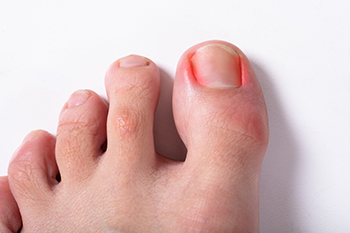 When a toenail curves at the sides and grows down into the surrounding skin, an ingrown toenail can form. This causes the toenail to dig deep into the skin resulting in pain, redness, and swelling in the affected area. Common methods that are used to prevent ingrown toenails can include wearing shoes and socks that allow enough room for the toes to move freely, keeping the feet clean and dry, and cutting the toenails straight across but not too short. Ingrown toenails may develop due to trauma, a fungal infection, psoriasis, or pressure that is applied on the nailbed from certain athletic activities. Other risk factors can include diabetes, circulation problems, or numbness in the toes. If you have an ingrown toenail that is persistent or looks infected, visiting a podiatrist can be extremely beneficial for your foot health.
When a toenail curves at the sides and grows down into the surrounding skin, an ingrown toenail can form. This causes the toenail to dig deep into the skin resulting in pain, redness, and swelling in the affected area. Common methods that are used to prevent ingrown toenails can include wearing shoes and socks that allow enough room for the toes to move freely, keeping the feet clean and dry, and cutting the toenails straight across but not too short. Ingrown toenails may develop due to trauma, a fungal infection, psoriasis, or pressure that is applied on the nailbed from certain athletic activities. Other risk factors can include diabetes, circulation problems, or numbness in the toes. If you have an ingrown toenail that is persistent or looks infected, visiting a podiatrist can be extremely beneficial for your foot health.
Ingrown toenails can become painful if they are not treated properly. For more information about ingrown toenails, contact Serjik Nazarian, DPM of Sedona Foot & Ankle Specialists. Our doctor can provide the care you need to keep you pain-free and on your feet.
Ingrown Toenails
Ingrown toenails occur when a toenail grows sideways into the bed of the nail, causing pain, swelling, and possibly infection.
Causes
- Bacterial infections
- Improper nail cutting such as cutting it too short or not straight across
- Trauma to the toe, such as stubbing, which causes the nail to grow back irregularly
- Ill-fitting shoes that bunch the toes too close together
- Genetic predisposition
Prevention
Because ingrown toenails are not something found outside of shoe-wearing cultures, going barefoot as often as possible will decrease the likeliness of developing ingrown toenails. Wearing proper fitting shoes and using proper cutting techniques will also help decrease your risk of developing ingrown toenails.
Treatment
Ingrown toenails are a very treatable foot condition. In minor cases, soaking the affected area in salt or antibacterial soaps will not only help with the ingrown nail itself, but also help prevent any infections from occurring. In more severe cases, surgery is an option. In either case, speaking to your podiatrist about this condition will help you get a better understanding of specific treatment options that are right for you.
If you have any questions please feel free to contact our offices located in Cottonwood and Prescott, AZ . We offer the newest diagnostic and treatment technologies for all your foot and ankle needs.
Read more about Ingrown Toenail Care